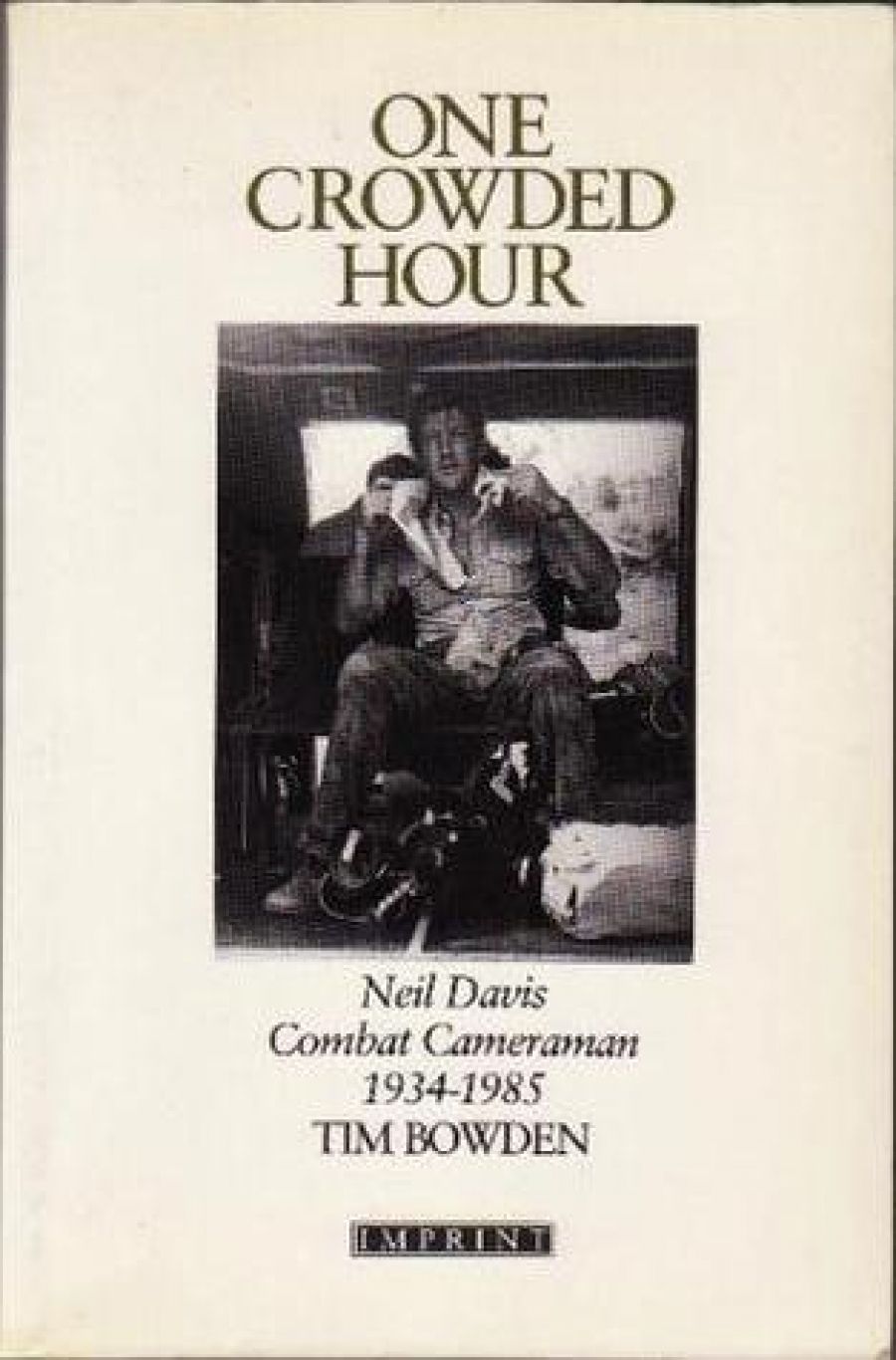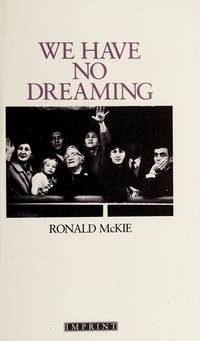
- Free Article: No
- Contents Category: Fiction
- Review Article: Yes
- Article Title: A paperback renaissance
- Online Only: No
- Custom Highlight Text:
If your interest in Australian literature predates its current flavour-of-the-month status, no doubt there exists, somewhere in your dinner-party repertoire, a screechingly funny reminiscence from the long ago, that winds up with some pompous professor of literature, or some arrogant publishing mogul, delivering the punchline, ‘Australian literature? Guffaw guffaw. I didn’t know there was any’.
- Book 1 Title: One Crowded Hour
- Book 1 Subtitle: Neil Davis, Combat Cameraman, 1934-1985
- Book 1 Biblio: Imprint, $14.95 pb, 436 pp
- Book 2 Title: We Have No Dreaming
- Book 2 Biblio: Imprint, $14.95 pb, 264 pp
- Book 2 Cover Small (400 x 600):

But that was only the beginning of an Australian literary renaissance that is really now making its impact felt throughout the Western literary world. As the 1970s rolled on into the 1980s, a number of new names were added to the list. Of course, Patrick White, our very own Nobel Prize winner, has just kept on keeping on, but other writers like David Malouf, Elizabeth Jolley, Helen Garner, and Jessica Anderson are also now being hailed as major talents, and, depending on your own particular bias, or on how inclusive you want to be, at least twenty others could be named who seem to have it in them to produce a masterpiece or at least a definitive something or other – if they haven’t already done so.
In retrospect, it seems that the atmosphere in the 1970s could hardly have been more conducive. For the first time in our history we had, in the form of the Literature Board, a national funding body endowed with sufficient power and funds to offer real cash support to a relatively large number of writers. We also had, for the first time, not one or two, but several major publishers willing and even eager to take a chance with local writers.
Literary agent, Rosemary Creswell, in an article in the April edition of Australian Bookseller and Publisher, suggests that it was no ‘accident’ that this period of intense activity coincided with the rise to prominence of Penguin Australia with their vastly expanded Australian list, and suggests that other publishers were greatly encouraged by their success: ‘No doubt,’ she writes, ‘Professor Leonie Kramer would claim a concomitant lapse in quality. But she would be wrong. The writing and publishing processes are interlocked and work best in tandem.’
While there is no denying that Australian literature, especially fiction, is enjoying a period of unprecedented success, and while I would be hard-pressed to find anything else I could agree with Professor Kramer about, I’m not entirely convinced that she is absolutely wrong on this point. We’ve all seen writers praised to the skies and awarded rich prizes for absolute rubbish in recent years. We mightn’t agree on just which are the rubbishy books, but most of us would agree that there have been plenty of them. In the atmosphere of euphoria that currently exists, it’s only natural that judgement should occasionally suffer. It is also only natural that publishers should be bending over backwards to make financial gain while the opportunity lasts. The question remains. Are there enough good books for all these publishers to produce?
Yes, I admit, with some reddening of the cheeks, that I was one of those, back in the 1970s, who pestered the daylights out of people to take an interest in Australian books. When I started writing regular articles and reviews in the early 1980s, it was still necessary to pester. But now that the pendulum has swung with such a vengeance, it seems time to take stock. It is wonderful that Australian writers are being published and read in their droves. Nor does it matter that some of the stuff being published is scarcely up to scratch. What matters is that we don’t always seem able to tell the difference.
These were the doubts weighing on my mind when I came to look at the latest move by a major publisher to set up an Australian list. The move came in May when Collins launched their new Imprint label with five paperback titles and as much fanfare as you can buy with, to quote the press kit, ‘a heavyweight S25,000 national advertising and public relations campaign’.
While I hate to say anything which might, even indirectly, reflect favourably on Rupert Murdoch, part-owner of Collins, and also given the fact that a certain cynicism is apparent in the publicity bumph, there is nevertheless no denying that Collins have got off to a very snappy and very clever start to their new venture. Imprint intends to produce an attractively designed and recognizable set of paperbacks covering fiction, biography, and general non-fiction aimed at the ‘intelligent reader interested in Australian writing’. All very worthy and good.
The importance of book design has been sadly overlooked in Australia. You might have noticed recently some positively hideous efforts, like the hardback editions of Peter Carey’s Oscar and Lucinda and Thea Astley’s It’s Raining in Mango. But the first thing you will notice about these new Imprint titles is their simple but beautiful jacket design. They really do look good. But of course that would be entirely useless if the titles themselves were second-rate, which they are not, despite the fact that none of our most famous writers are included.
The lead title is the paperback version of Tim Bowden’s One Crowded Hour: Neil Davis, Combat Cameraman, 1934-1985 (Imprint, $14.95 pb, 436 pp), which sold a very pleasing 15,500 copies in the hardback edition and, as the publishers assure booksellers in their bumph, ‘is sure to be a great success in paperback’. Obviously a sound business decision. Booksellers are assured that Bowden is ‘incredibly popular with the media’ and ‘will really plug the Imprint range’.
Also included is Ronald McKie’s We Have No Dreaming (Imprint, $14.95 pb, 264 pp). McKie is probably best known for The Mango Tree which won the Miles Franklin Award. McKie was a journalist for forty years, and during that time managed to be at the right place at the right time on many occasions: like the time he found himself standing near Winston Churchill outside Adolf Hitler’s bunker just yards from the scorched earth where Hitler’s body had been burned, or another moment he describes when, bending over the naked body of Mussolini in his coffin, he counted the bullet holes in the dead dictator’s ‘pigeon’ chest. We Have No Dreaming is ‘a personal walkabout’ through the eighty eventful years of McKie’s life.
Another canny bit of business is the inclusion of Charmain Clift’s Mermaid Singing (Imprint, $12.95 pb, 216 pp), which is sure to sell well. The other two titles offered in the initial run are likely to be more slow to move. Faith Richmond’s Remembrance (Imprint, $12.95 pb, 192 pp) is yet another autobiographical account of an Australian girlhood. Don’t let that put you off, though. I haven’t finished it yet, but am enjoying it very much. Richmond could tum out to be a real find.
Finally, another new writer, Jane Hyde, is represented here with her second book, Between the Flags and Other Stories (Imprint, $12.95 pb, 131 pp). The jacket blurb probably holds the key to why I didn’t go for these stories in a big way:
Jane Hyde’s characters gamely survive the incertitude of the eighties, fortified by laughter and the reckless hope that their dreams of order and safety might come true.
These are the sorts of stories you ‘take heart’ from. Not my cup of tea, really, but nicely written and plenty of people are going enjoy Jane Hyde.
Several more titles will appear in July and September, including an anthology of women’s erotica and a collection of Australian women’s writing from colonial to contemporary times – both bound to sell well.
Imprint has been very thoroughly thought out. Sure, there’s any amount of business nous involved, and you might prefer to call that cynicism. But for the time being I’m prepared to remaining hopeful. Provided the Aust Lit bubble doesn’t burst too soon, and Collins doesn’t get taken over by a publisher who doesn’t care about these things (which is always on the cards these days), and of course provided that the primary producers can keep producing good quality texts with some commercial appeal, Imprint is bound to do well.


Comments powered by CComment